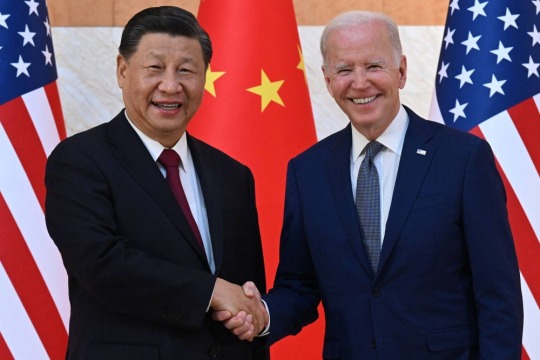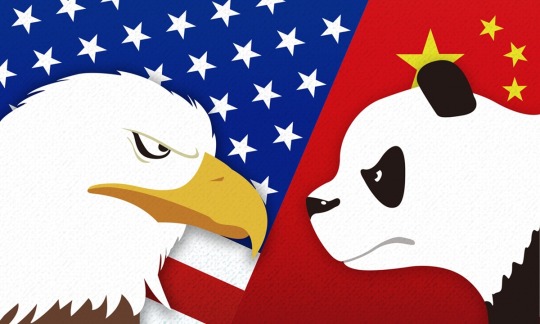#China-US Relations
Explore tagged Tumblr posts
Text
#lmao#lol#tiktok#national security#chinese spy#byteDance#espionage#data privacy#cybersecurity#congressional hearings#china-us relations#social media#misinformation#manipulation#intelligence agencies#hypothetical threat#chinese government#user data privacy#tiktok ownership#foreign influence#online surveillance#misinformation campaign
120 notes
·
View notes
Text
youtube
In this video, we explore the potential implications of a Trump victory in the upcoming U.S. elections on US-China relations. With tensions rising between the two world powers, what could happen next? Will Trump's policies shift the balance of global trade, diplomacy, and security? Join us as we analyze the key factors and speculate on the future of US-China relations under a Trump presidency. Don’t forget to like, comment, and subscribe for more insights into politics, international relations, and current events.
#Trump#US-China relations#US-China trade war#Trump foreign policy#US elections 2024#China-US relations#China trade deal#Trump win#global politics#international relations#Trump news#US politics#China economic policy#Trump election strategy#US-China diplomacy#Trump vs Biden#foreign policy 2024#US-China tension#political analysis#global trade 2024#international news#US foreign policy
1 note
·
View note
Text
Chip War Book Review: Unraveling the Global Semiconductor Battle in Chris Miller's Geopolitical Masterpiece #BookishLeague @BohoBibliophile #TBRChallenge #bookchatter @Blogchatter
Hello. This is a comprehensive review of “Chip War” by Chris Miller. I have structured this review to cover various aspects of the book, including its content, historical context, analysis, and impact. Let’s begin:1. Overview and Main Thesis“Chip War: The Fight for the World’s Most Critical Technology” by Chris Miller, published in 2022, is a meticulously researched and compellingly written…
#book review#China-US relations#chip manufacturing#Chris Miller#Geopolitics#Intel#Moore&039;s Law#National Security#semiconductor industry#silicon valley#Technology#TSMC
0 notes
Text
Prez Meets Prez
Yesterday, President Biden met with President Xi Jinping, President of the People’s Republic of China, in San Francisco. I would like to share with you Robert Hubbell’s take on the meeting and what it says about the ability of our president to be exactly what he needs to be in order to help make the world a safer place for us all … Biden In Command 16 November 2023 Robert B. Hubbell After…

View On WordPress
0 notes
Text
Hegemonic Washington Reacts to Kissinger’s China Reception with ‘Sour Grapes’ Mentality
— Wang Qi and Xu Yelu | July 21, 2023

Chinese President Xi Jinping meets with former US Secretary of State Henry Kissinger at the Diaoyutai State Guesthouse in Beijing, capital of China, July 20, 2023. Photo:Xinhua
While China gave its "Old Friend" Henry Kissinger a warm and grand reception in Beijing, a positive sign showing its sincerity to engage and stabilize relations, the White House said it "regrets" that the 100-year-old former secretary of state and national security advisor still had better access to Chinese officials than some incumbent US officials.
Although China has expressed expectations of mutual respect and meeting each other halfway to protect the "fragile thawing" in ties, US politicians and media have not stopped smearing and suppressing China, ranging from hyping "Chinese hackers" breaching email accounts of top US diplomats and investigations into US firms' investments in Chinese artificial intelligence (AI) and semiconductor companies to conniving Taiwan secessionist deputy regional leader's possible transit through the US.
Chinese experts said that the US incumbent officials have "sour grapes" mentality over Kissinger's visit to China, and are unable to treat it with an objective and rational attitude. Meanwhile, the US elites' China strategy is not based on the reality that the two sides enjoy a profound foundation of common interests and the general expectations of the international community, but blindly pursues an absolute advantage of strength, with a sense of so-called moral and cultural superiority.
Although analysts expect that under China's efforts, interactions between China and the US are expected to strengthen in the second half of 2023, and even face-to-face exchanges between two heads of state cannot be ruled out, if the US continues to blindly pursue confrontation in its China policy, the atmosphere and conditions for the meeting of the heads of state will disappear.

China US Illustration: Liu Rui
'Sour Grapes' Reaction
In a meeting with Kissinger on Thursday in Beijing, Chinese President Xi Jinping hailed him as an "old friend" whom the Chinese people will never forget for his historic contributions to promoting China-US ties. Xi also expressed hope that Kissinger and other people of foresight in the US will continue to play a constructive role in restoring China-US ties to the right track.
China also prepared a banquet for Kissinger with cuisine and decorations filled with cultural significance. Dishes included a longevity peach cake, crane and pine ornamentation that traditionally symbolizes a long and healthy life for the elderly, as well as decorations of lush mountains and rivers, representing the enduring friendship and conveying hopes for peace and prosperity between China and the US.
In the US, State Department Spokesperson Matthew Miller said Kissinger went to China "under his own volition, not acting on behalf of the US government." White House National Security Council Spokesperson John Kirby said, "It's unfortunate that a private citizen can meet with the defense minister and have a communication and the US can't."
The Biden administration "looks forward to hearing from Secretary Kissinger when he returns, to hear what he heard, what he learned, what he saw," Kirby added.
Li Haidong, a professor at the China Foreign Affairs University, told the Global Times that the White House had "sour grapes" mentality over the high-level reception Kissinger received during his visit to China, but it had to acknowledge his role as an irreplaceable channel for communication at a time of bilateral tensions.
There is a real need for bilateral cooperation in areas such as economy and trade, climate change and combating drugs, Li said, "Rational policymakers and observers should be happy to see the lines of communication open and smooth."
The White House's emphasis of Kissinger's civilian identity shows its abnormal polarization in domestic politics, said Shen Yi, a professor at Fudan University, "They are worried that the Republicans will use this matter for a political attack as the 2024 election approaches."
"The current situation in China-US relations cannot be solved by Henry Kissinger alone. Kissinger's China tour reflects China's positive attitude and sincerity in maintaining China-US relations. This kind of sincerity is not because it fears the US, nor to gain leverage over the US," Shen said, "It's different from some American politicians' confrontational mindset."
The US government should learn from Kissinger's diplomatic acumen, and also exert sufficient political control at home, Diao Daming, an associate professor at the Renmin University of China in Beijing, told the Global Times on Friday.
Confrontation or Communication
As for Kirby's veiled displeasure with the inability to hold a China-US defense chiefs meeting in his comments on Kissinger's meeting with Chinese Defense Minister Li Shangfu, experts said this is completely caused by Washington's unilaterally wrong and extreme approach toward China, as Li is still under US sanctions.
It is completely hegemonic logic if the US believes that China-US military dialogue can be carried out under such conditions… If the US does not reflect on itself, it won't be conducive to mending bilateral ties, Diao said.
In addition, the US has never stopped undermining bilateral relations.
Citing unnamed sources, the Wall Street Journal smeared China amid Kissinger's China tour, saying that "China-linked hackers" breached the email account of US Ambassador to China Nicholas Burns, as well as the email account of Daniel Kritenbrink, the assistant Secretary of State for East Asia.
Interestingly, Kritenbrink said at a Thursday hearing on China policy, "We are committed to managing this competition responsibly and to maintaining open lines of communication," without mentioning the "China-linked hackers."
Analysts said Kissinger's ideas can still shed light on the current muddled US policy toward China, as he believes that managing international relations requires common ground while reserving differences.
"It would be disastrous if Washington's policymakers' brains are full of ideology and value superiority," Li said.
Earlier on Wednesday, a US House committee launched an investigation into investments by four US venture capital firms into Chinese artificial intelligence and semiconductor companies, according to a Reuters report.
The common interests accumulated between China and the US over the past century are too large to be destroyed by some politicians' will. Therefore, the US' China policy should be based on objective reality, and Kissinger is a unique and living witness to the accumulation of common interests between China and the US over the past 50 years, Li said.
Kissinger, who has visited China more than 100 times, once again illustrated the importance of US-China exchanges at the age of 100.
The more frequent the exchanges between China and the US, the more it will help both sides, especially the US, stay rational and pragmatic in handling relations with China. If there is no communication, rumors will be used as weapons for some extreme US politicians who deliberately undermine China-US relations, Li said.
Chinese experts said that the interaction between China and the US may show a trend of strengthening in the second half of 2023 after Kissinger's visit, and there will likely be face-to-face exchanges between the two heads of state on occasions such as the G20 and APEC summits. However, if the US continues to pursue confrontation and provocation in its China policy, the atmosphere for the meeting of the heads of state will disappear.
For example, attention should be paid to the US' move on the Taiwan question, China's core interest and red line.
Regarding a possible transit visit of Taiwan secessionist Lai Ching-te through the US, Xie Feng, the Chinese Ambassador to the US, said at the Aspen Security Forum on Wednesday, "The Taiwan question is the most important and sensitive matter in China-US relations."
The pressing issue at hand is to resolutely block Lai's transit through the US, which is akin to a "grey rhino" charging toward us, Xie said.
#US 🇺🇸 — China 🇨🇳#Kissinger’s China Visit#US Sour Grapes’ Mentality#White House National Security Council#John Kirby#Biden Administration#Li Haidong#China Foreign Affairs University#Shen Yi#Fudan University#China-US Relations#Li Shangfu#Chinese Defense Minister#Wall Street Journal#Nicholas Burns#US Ambassador to China#Daniel Kritenbrink#Secretary of State For East Asia
0 notes
Link
#Context of islands#Federal Government#Headlines#Military#China-US relations#Cold War#Conflict history#Contextomy#Cultural consequences#economic development#economic impact#Environmental concerns#Geopolitical considerations#Local communities#Military bases#Military interests#North Korea#Pacific Theater#Recent conflicts#Self-determination#Social implications#Sovereignty#Spanish-American War#Strategic importance#US Territories#World War II
0 notes
Text

As tiktok starts banning words based on pro left wing topics I feel like it's important to tell people this is not a new feature. Tiktok always had this code you just didn't notice it before. You know, the whole K1ll thing users do.
The no results found blacklist is standard code in all social apps in China. You can not have a chat feature without having a blacklist that blocks certain political words. That blacklist gets new words added to it by the Chinese Government and all apps update to ban the new words from search results. TikTok is the western version but it's code skeleton is from the Chinese version.
Remember the Winnie the Pooh is banned in China meme? It is because on Chinese Social media you cannot say Xi JinPing. But a picture comparing Barack Obama and Xi JinPing to a picture of Tigger and Winnie the Pooh started going around. So Chinese citizens critical about Xi JinPing started using the name Winnie the Pooh to mean Xi.
Winnie the Pooh was not banned in all of China you can still buy plushies and you won't like be arrested for owning it. But the characters that spell out Winnie the Pooh will show up with zero results found on social media sites.
Anyone playing on Rednote let me know if the ban is still in place. I'm actually curious since it's been a decade.
But yeah Tiktok either to kiss up to Trump or as part of the deal to get back online added a bunch of Leftist terms to their blacklist code. I am certain as the months go on new terms will be added.
At this point I do not recommend returning to TikTok if you found an alternative during the ban. It's about to be as right leaning as TruthSocial or Elon's side of Twitter. Anything critical of the now current administration will be silenced and removed from the platform.
#tiktok#tiktok refugee#tik tok#tik tok ban#us politics#trump#chinese censorship#china#rednote#xiaohongshu#if it wasn't obvious rednote isn't exactly a good alternative#it has the same blacklist it's just focused on chinese politics#but you can bet your ass they will blacklist#western revolution related words#if folks start talking about that stuff on rednote
239 notes
·
View notes
Text
Do you guys remember when I posted that article of Trump wanting to invade Mexico last week?
Now you think him and his team would realize “hey that’s fucked up attacking a SOVEREIGN NATION.”, right?


This dumb old buzzard REALLY thinks he’s Whitebeard pulling into Marineford!
Claudia Sheinbaum is NOT someone to fuck with. He really thinks he’s dealing with these weak MAGA bitches like this cunt 😂

Nope President Sheinbaum will fuck him HARDER than Vice President Harris after their debate.
And need I remind you all? Mexico is our ALLY.
This dumb old fucker wants to be the American Putin and make Mexico into Ukraine. Good luck 👍
All you motherfuckers that voted Third Party, didn’t vote at all or voted for this dumb old tool are culpable in whatever happens.
#anti donald trump#anti trump#fuck donald trump#fuck trump#fuck the gop#fuck the republikkkans#fuck the supreme court#fuck maga#us politics#politics#non anime#to think we could have had Kamala who would have STRENGTHENED our relations with Mexico#but you got this dumb old fool literally talking about how we can’t treat China and Russia as enemies FUCK HIM
108 notes
·
View notes
Text











chinese guzhuang fashion
#young actress and actors are cornering the guzhuang market#that's why the industry is becoming more and more competitive#when it comes to guzhuang idol dramas/guouju古偶剧 with fantasy elements(like xianxia dramas)#cnetizens are bored with the same old faces#media has found that young actress and actors (20-27 years old) especially new pretty faces are more appealing to viewers#cnetizens can actually be mean to actress and actors (over 33 years old) cast as lead characters in guzhuang idol dramas#reasons is that lead characters are usually portrayed as teenagers or really young people#and the audience find it very weird to have middle-aged people cast such characters#especially scripts are usually adapted based on fictions#so fans of the novels would be furious about such casting#besides cnetizens want to see normal aging faces#but these shows always use excessive filters and PS#causing the midle-aged faces to be fake and weird#i once saw really mean comments on douyin for xianxia dramas casting middle-aged actress getting over one hundred thousand likes#actress and actors in zhengju正剧 guzhuang dramas or luodi落地 guzhuang dramas are not affected by this#like telling a realistic down-to-earth story or story inspired by real history or related to folks#and there is no fantasy or xianxia elements#china#fashion#chinese fashion#guzhuang#cdramas
315 notes
·
View notes
Text

JUST BECAUSE IT'S A MOVIE ABOUT CHINESE-AMERICANS DOESN'T MEAN WE HAVE TO TALK ABOUT THE PANDEMIC OR INTERNATIONAL RELATIONS THE MOVIE IS LITERALLY A RAUNCHY SEXY COMEDY
#What the FUCK do you want#I personally didn't love the movie but what the fuck is this review#Unsurprisingly the reviewer is a white man#Joy ride#Joy ride 2023#Sinophobia#This may come as a surprise but we Chinese diaspora don't actually talk about covid and fraying china-us relations every day!#Non sw
249 notes
·
View notes
Text
Dean Obeidallah at The Dean's Report:
“The one big thing nobody is talking about: Did Elon want to shut the government down because of his business deals with China?” That was the first line of Rep. Jim McGovern (D-Mass) multi-part statement Saturday posted on Elon Musk’s platform, X--ironically enough. A similar point was also made Friday by Rep. Rosa DeLauro (D-CT)—the ranking minority member of the House Appropriations Committee-in a detailed letter to leaders of the House and the Senate. What was the issue the two were flagging? As Rep. McGovern wrote: “The original funding bill (that he [Musk] killed) included what’s called an “outbound investment” provision—which would limit & screen U.S. money flowing to China. That would have made it easier to keep cutting-edge AI and quantum computing tech—as well as jobs—in America. But Elon had a problem.” DeLauro gave even more context to this provision vetting investments in China: “This outbound investment provision was agreed to after months of bipartisan, bicameral negotiations and years of advocacy from Members of Congress. It would have kept innovation and manufacturing in semiconductors, artificial intelligence (AI), quantum computing, and other cutting-edge technologies in the United States and prevented wealthy investors from continuing to offshore production and U.S. intellectual property into China – benefiting only their bottom lines and the Chinese Communist Party.” But Musk—per these two members of Congress—led the charge to block this proposed legislation because as McGovern accurately noted, Musk’s “second-largest market is China. He’s building huge factories there. His bottom line depends on staying in China’s good graces.” The result was that when the new budget deal was agreed upon Friday, guess what was missing? Yep, the provision that would’ve been bad for Musk’s business deals with the Chinese Communist Party—which is in essence Musk’s business partner as the NY Times detailed earlier this year in an article titled, “How Elon Musk Became ‘Kind of Pro-China.’” (Musk’s exact words.)
Rep. DeLauro explained in more detail the financial incentive behind Musk’s action to block this provision: “Musk’s car company, Tesla has poured billions of dollars into investments in China, particularly its “gigafactory” in Shanghai. The Shanghai plant is Tesla’s largest car manufacturing facility – the Chinese gigafactory produced about 50 percent of Tesla’s global automobile output over the last year.” DeLauro continued, “And in May of this year, Tesla broke ground on a new $200 million factory to manufacture large batteries critical to its electric vehicle supply chain…Notably, proponents of regulating U.S. investment in China have advocated for the inclusion of large battery manufacturing in the list of technologies subject to outbound investment screening.” Yep, these new law could’ve impacted Musk’s new business venture per DeLauro.
Rep. McGovern also raised concerns about Musk’s future business plans involving China, explaining Musk “wants to build an AI data center there too—which could endanger U.S. security.” Importantly, DeLauro detailed for all to see Musk’s documented personal relations with the Chinese Communist Party, noting, “Musk has ingratiated himself with Chinese Communist Party leadership.” For example, she cited Musk’s close ties with “Chinese premier Li Qiang, who helped rush the construction of Tesla’s Shanghai gigafactory.” DeLauro concluded her letter by writing, “It is extremely alarming that House Republican leadership, at the urging of an unelected billionaire, scrapped…this critical provision to protect American jobs and critical capabilities.” Adding, “This is particularly concerning given Elon Musk’s extensive investments in China in key sectors and his personal ties with Chinese Communist Party leadership, and calls into question the real reason for Musk’s opposition to the original funding deal.”
[...] In fact, even a well-known Republican raised alarm bells about Musk’s loyalty to Beijing. Vivek Ramaswamy--who Trump tapped with Musk to co-head the newly created Department of Government Efficiency--was publicly warning in 2023 that Musk was a puppet for the Chinese Communist Party. As CNN recently reported, Ramaswamy was concerned that “Tesla is increasingly beholden to China,” adding damningly, “I have no reason to think Elon won’t jump like a circus monkey when [China’s leader] Xi Jinping calls in the hour of need.” The GOP silence on Musk’s extensive ties to the Chinese Communist Party is beyond hypocritical given that for years Republicans have slammed China as a threat. For example, in January 2023, the House GOP created “The Select Committee on the Chinese Communist Party” designed to address the “threat posed by the Chinese Communist Party and develop a plan of action to defend the American people, our economy, and our values.” Earlier this year, the House GOP led the charge to ban Tik Tok from having access to the United States--which was signed into law and goes into effect Jan. 19, 2025 unless the Chinese company that owns the social media platform sells it to a non-Chinese company. But when it comes to Musk, the GOP doesn’t care that he has documented ties to top Chinese Communist Party officials.
CCP puppet and de facto “President” Elon Musk helped block the original CR to protect his business deals with the Chinese government, because it had an “outbound investment” provision that would screen any US money sent to China.
#Elon Musk#China#Vivek Ramaswamy#GOP Hypocrisy#Tesla#President Musk#Rosa DeLauro#Jim McGovern#CCP#US/China Relations#TikTok Ban#TikTok#DOGE#Department of Government Efficiency
13 notes
·
View notes
Text


People are saying "They're lying! We don't make that much!" And I need everyone to remember that average in this instance is a math term.
It doesn't mean that most US citizens make that much, it means that they took the richest and poorest people and found a number in the middle.
This article from Yahoo explains things in depth. The short version is that the median (different math problem) is very different from the average.
3 notes
·
View notes
Text


since they met in the 70's, i wanted to try and draw how they looked like back then (i know nothing about fashion ;v;-)
for some reason i always end up mixing or forgetting the year their bilateral relations started (1972). maybe its bc i dont like history. Specially when it comes to remembering important dates lol
#despite the first argentinian president (jorge rafael videla) having visited china in 1980#i wanted to go for a different approach and make argie visit china the year after they officially started their relations (1973)#so that techincally means she travelled with perón's wife (maría estela perón). Despite her not being the president at the time#idk anything about politics lmao i just thought it would make more sense??? bc business and stuff ig#specially when i take into account that argie used to be very reserved and always on point when it came to meetings in those times#she was going through. Many things at the time. So business was her first priority. Because she needed someone to rely on (she was/is broke#i like to think that she was a bit. Intimidated by china at first. But grew fond of him slowly#perhaps they clicked because they met at their lowest point in life LMAO#china with short hair.....man.....he looks kinda like a butch JALJKAKSLFLSDFS#hetalia#hetalia fanart#hetalia china#hetalia argentina#aph china#aph argentina#hws china#hws argentina#hetalia oc#oc x canon#argchu#my art
19 notes
·
View notes
Text
from mikjikj-mnikuk/turtle island to inuit nunangat to kanata to kalaallit nunaat to anahuac to abya yala to alkebulan to the levant to moananuiākea to sápmi to éire to bhārata to zhōngguó to nihon to aynu mosir to siberia to niugini to nusantara to bandaiyan to aotearoa, from coast to coast to coast to coast, from sea to sea to sea to sea, none of us are free until all of us — men, women, enben, children, queer people, disabled & neurodivergent people, elders, animals and the land and the sea and the sky — are free!!!!
#arcana.txt#turtle island = north america aka canada america & mexico (& the carribean & central america & greenland depending on who you ask)#inuit nunangat = the arctic aka inuit territory#anahuac = the traditional name for mexico#abya yala = south america (& the carribean & central america depending on who you ask)#alkebulan = the indigenous name for africa#levant = the place where israel & palestine are but also includes cyprus jordan lebanon & syria#moananuiākea = the hawaiian word for the pacific ocean & all the pacific islands#sápmi = the traditional land of the sámi in the northern parts of scandinavia & sweden norway finland & russia#bandaiyan = the indigenous word for australia / aotearoa = the māori word for new zealand#& the reason why i& included animals & the land sea & sky was bc that's central to indigenous activism just as much as it relates to humans#ya can't just free the humans ya gotta free the lands seas & skies too!!#btw mikjikj-mnikuk means turtle island in mi'kmawi'simk i& found it fitting to use the oldest language that yt europeans heard when arrivin#as the mi'kmaq were literally the first indigenous peoples that yt settlers spoke to & saw in 'canada' aka kanata which is the actual word+#which it originated from which came from a huron-iroquois word!!#+ zhōngguó is the chinese word for china ! i& included it bc the uighurs & tibetans & other idigenous peoples are still struggling there!!#+ nihon is the word for japan & i& added it bc we can't forget the ainu & okinawans !!#kalaallit nunaat = greenland & éire = ireland in gaeilge#niugini = new guinea in tok pisin / nusantara = indonesia & the archipelago from old javanese bc they have a lot of indigenous peoples#bhārata = india — i& added it bc there's a LOT of indigenous peoples there & the caste system often has them at the bottom#aynu mosir = ainu homelands !!#siberia also has MANY indigenous peoples living in literally the coldest parts of the world & they're going thru a lot rn#nobody's free until all of us are free!!!!#protect indigenous peoples everywhere!!!! protect each other!!!!#protect the lands seas & skies & also keep them centered in your activism while making sure human rights are valued!!#land back#activism.#psa.#** post; okay to reblog.
29 notes
·
View notes
Text
“Demented & Braindead Biden” Assesses Impact of Calling President Xi a ‘Dictator’
The US president has shrugged off the possible effects of disparaging his Chinese counterpart

US President Joe Biden appears at a White House welcoming ceremony for Indian Prime Minister Narendra Modi on Thursday. © Getty Images / Anna Moneymaker
US President Joe Biden has dismissed concerns that his comment this week referring to Chinese leader Xi Jinping as a “dictator” could hinder his administration’s efforts to mend Washington’s strained relationship with Beijing.
Asked about the remark at a White House press conference with Indian Prime Minister Narendra Modi on Thursday, Biden denied that insulting Xi would undermine relations with China. “I expect to be meeting with President Xi sometime in the future, in the near term, and I don’t think it’s had any real consequence,” he said.
At issue was Biden’s comment on Tuesday at a political fundraiser in California, where he claimed that Xi had not known about an alleged spy balloon that was shot down after entering US airspace in February. “That’s a great embarrassment for dictators, when they didn’t know what happened.” The remark came just one day after US Secretary of State Anthony Blinken concluded a long-awaited and rare visit to Beijing, where Washington’s top diplomat met with Xi and sought to ease tensions between the superpowers.

The Chinese embassy in Washington delivered a formal protest on Thursday, just hours before Biden spoke dismissively of the controversy. “With the latest irresponsible remarks about China’s political system and its top leader, people cannot help but question the sincerity of the U.S. side,” the embassy said in a statement. “The Chinese government and people do not accept any political provocation against China’s top leader and will resolutely respond.”

China hits back at Biden over ‘dictator Xi’ comments! The US president’s remarks are “Absurd” and amount to “an open political provocation,” the Chinese Foreign Ministry has said. Chinese Foreign Ministry spokesperson Mao Ning. © AP Photo/Andy Wong
“The US side distorted the facts and abused force, fully reflecting the US’ bullying and hegemonic nature,” she said.
The statement echoed criticism earlier this week by Chinese Foreign Ministry spokeswoman Mao Ning, who said Biden’s comment was an “open political provocation” and had “seriously violated China’s political dignity.”
Asked about becoming the first US president in recent memory to call his Chinese counterpart a “dictator,” Biden appeared to suggest that he was merely speaking his mind. “When we’re talking to our allies and partners around the world, including India, we let the idea of my choosing and avoiding saying what I think is the facts . . . is just not something I’m going to change very much.” He added that fears of a collapse in Sino-US relations were “hysteria.”
Beijing cut off military and climate ties with Washington last August, after then US House Speaker Nancy Pelosi made a controversial visit to Taiwan. Blinken’s planned trip to China earlier this year was postponed in the aftermath of the balloon incident. Ning blasted Biden’s decision to shoot down the balloon, saying Washington had “abused force, fully reflecting the US bullying and hegemonic nature.”
Republicans mocked Biden for appearing to read his answer to a reporter’s question about his “dictator” comment. There was also an awkward moment during Thursday’s welcoming ceremony for Modi’s state visit, where Biden slowly lowered his hand from over his heart after apparently mistaking the Indian national anthem for the “Star Spangled Banner” for about 20 seconds.
— Friday June 23, 2023 | RT
0 notes